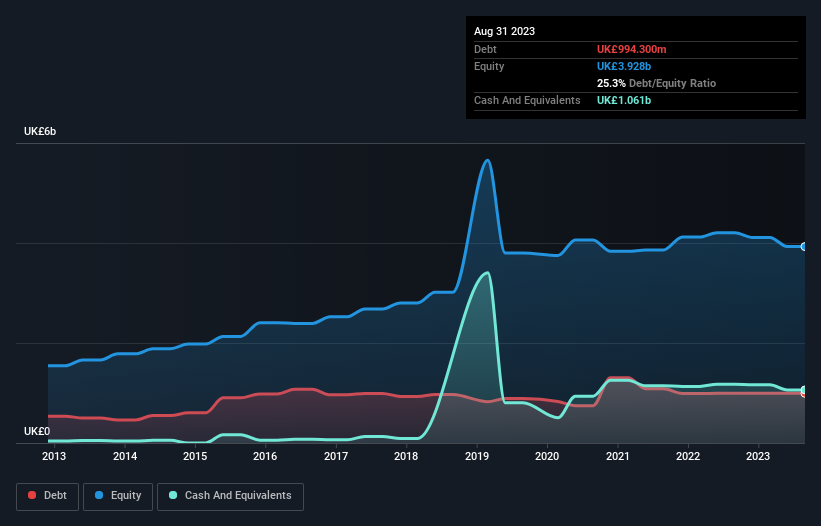
Warren Buffett famously said, 'Volatility is far from synonymous with risk.' So it might be obvious that you need to consider debt, when you think about how risky any given stock is, because too much debt can sink a company. As with many other companies Whitbread plc (LON:WTB) makes use of debt. But the real question is whether this debt is making the company risky.
Why Does Debt Bring Risk?
Debt is a tool to help businesses grow, but if a business is incapable of paying off its lenders, then it exists at their mercy. If things get really bad, the lenders can take control of the business. However, a more usual (but still expensive) situation is where a company must dilute shareholders at a cheap share price simply to get debt under control. Of course, plenty of companies use debt to fund growth, without any negative consequences. When we think about a company's use of debt, we first look at cash and debt together.
Check out our latest analysis for Whitbread
What Is Whitbread's Debt?
The chart below, which you can click on for greater detail, shows that Whitbread had UK£994.3m in debt in August 2023; about the same as the year before. However, it does have UK£1.06b in cash offsetting this, leading to net cash of UK£67.0m.

How Healthy Is Whitbread's Balance Sheet?
We can see from the most recent balance sheet that Whitbread had liabilities of UK£852.9m falling due within a year, and liabilities of UK£5.00b due beyond that. Offsetting these obligations, it had cash of UK£1.06b as well as receivables valued at UK£123.8m due within 12 months. So its liabilities outweigh the sum of its cash and (near-term) receivables by UK£4.67b.
This deficit is considerable relative to its market capitalization of UK£6.63b, so it does suggest shareholders should keep an eye on Whitbread's use of debt. Should its lenders demand that it shore up the balance sheet, shareholders would likely face severe dilution. Despite its noteworthy liabilities, Whitbread boasts net cash, so it's fair to say it does not have a heavy debt load!
Importantly, Whitbread grew its EBIT by 78% over the last twelve months, and that growth will make it easier to handle its debt. When analysing debt levels, the balance sheet is the obvious place to start. But ultimately the future profitability of the business will decide if Whitbread can strengthen its balance sheet over time. So if you're focused on the future you can check out this free report showing analyst profit forecasts.
Finally, while the tax-man may adore accounting profits, lenders only accept cold hard cash. While Whitbread has net cash on its balance sheet, it's still worth taking a look at its ability to convert earnings before interest and tax (EBIT) to free cash flow, to help us understand how quickly it is building (or eroding) that cash balance. Over the most recent two years, Whitbread recorded free cash flow worth 76% of its EBIT, which is around normal, given free cash flow excludes interest and tax. This cold hard cash means it can reduce its debt when it wants to.
Summing Up
Although Whitbread's balance sheet isn't particularly strong, due to the total liabilities, it is clearly positive to see that it has net cash of UK£67.0m. And we liked the look of last year's 78% year-on-year EBIT growth. So we are not troubled with Whitbread's debt use. Above most other metrics, we think its important to track how fast earnings per share is growing, if at all. If you've also come to that realization, you're in luck, because today you can view this interactive graph of Whitbread's earnings per share history for free.
At the end of the day, it's often better to focus on companies that are free from net debt. You can access our special list of such companies (all with a track record of profit growth). It's free.
Valuation is complex, but we're here to simplify it.
Discover if Whitbread might be undervalued or overvalued with our detailed analysis, featuring fair value estimates, potential risks, dividends, insider trades, and its financial condition.
Access Free AnalysisHave feedback on this article? Concerned about the content? Get in touch with us directly. Alternatively, email editorial-team (at) simplywallst.com.
This article by Simply Wall St is general in nature. We provide commentary based on historical data and analyst forecasts only using an unbiased methodology and our articles are not intended to be financial advice. It does not constitute a recommendation to buy or sell any stock, and does not take account of your objectives, or your financial situation. We aim to bring you long-term focused analysis driven by fundamental data. Note that our analysis may not factor in the latest price-sensitive company announcements or qualitative material. Simply Wall St has no position in any stocks mentioned.
About LSE:WTB
Whitbread
Operates hotels and restaurants in the United Kingdom, Germany, and internationally.
Good value with adequate balance sheet and pays a dividend.


